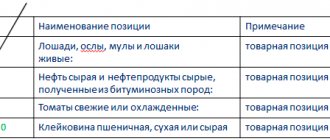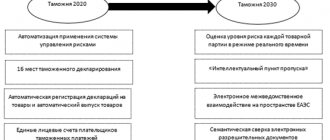-A-
Administrative settlement of customs offenses
This is a procedure established by national legislation under which the customs administration is empowered to settle a customs offense either by way of an order or a compromise.
Advance secured by documents
This is a loan secured by documents confirming the shipment of the goods.
ASIKUDA - Automated system for processing customs data
This is a computerized system for the automatic processing of customs declarations, developed by UNCTAD jointly with the World Customs Organization. The ASICUDA-World version was introduced in 2004 and significantly increased the efficiency of the system (UNCTAD)
The essence of customs management
Definition 1
Customs management is a type of management in the public service, which is associated with the implementation of the tasks of customs affairs.
Customs business is a hierarchical system, which includes: theoretical, mathematical, physical, verbal and other models. The development of market relations influenced the development of customs affairs. The beginning of economic relations between states served as an impetus for the development of customs management.
The role of the customs administration has increased at a progressive rate over the past decades. This is due to the need to make strategic decisions in the activities of the FCS (Federal Customs Service).
Are you an expert in this subject area? We invite you to become the author of the Directory Working Conditions
Customs is a synthesis of management and public administration and is an independent scientific field.
-IN-
Currency control
This is an integral part of the state’s foreign exchange policy in the field of organizing control and supervision over compliance with legislation in the field of foreign exchange and foreign economic transactions: control over the movement of currency values across the customs border; over foreign exchange transactions; or over the fulfillment by residents of obligations to the state in foreign currency
Foreign trade contract, foreign trade agreement
This is the main commercial document of a foreign trade transaction, indicating an agreement reached between the parties. The subject of a foreign trade contract can be the purchase and sale of goods, contract work, rent, licensing, granting the right to sell, consignment, etc. Payments for the supply of goods and provision of services under a foreign trade contract can be made in foreign, international, national currency and on a non-currency basis
Temporary certificate of insurance; covernot
This is a document issued by an insurer (insurance broker, agent, etc.) to notify the policyholder that his insurance instructions have been complied with (UNECE/FAL)
History of customs administration
The origin of customs business in Russia dates back to the middle. 9th century. This circumstance was facilitated by the emergence of statehood among the Slavs - Kievan Rus, and active trade activity - the Slavs themselves conducted active trade, moreover, through the territory of Kievan Rus there was a route from the Varangians to the Greeks.
The nature of management was determined by the fact that the customs of Rus' at that time was not yet an independent instrument of state regulation in the full sense of the word, but, on the contrary, purely political (mainly military). The young Russian state, having entered the world stage, tried to impose its interests in this area. Borders are stabilized, and within their boundaries the further development of productive forces occurs, new relationships, new spheres and types of activity mature. The increasing complexity of public relations and further specialization in newly emerging and developing activities inevitably leads to the formation of habits and isolation of those involved in these activities.
To date, not much evidence has survived that allows us to get a complete picture of the content and nature of customs in Ancient Rus'. During this period, it was distinguished primarily by its private law character. That is, customs duties were collected from merchants or travelers not by the supreme power, but by direct landowners, nobles and monasteries at their own discretion: for the maintenance of roads or markets, for permission to travel on roads or be in markets.
The unification of neighboring principalities around Moscow strengthened the Russian state. Ivan III, Vasily III, and then Ivan IV tried to impose some regulatory duties on foreigners. Interest in replenishing the treasury forced the central government to become more involved in customs administration. It was the treasury that became the cradle of the administrative apparatus of the new Russian state. In 1554-1555 the Great Order (mentioned in 1573) was separated from the treasury. Soon he became the main financial body of the state, was in charge of managing customs affairs, monitored the accuracy of weights and measures throughout the Russian state, was responsible for receiving customs duties, money, money transfers, bridges, etc. This is how customs business began in Russia.
For a long time, the country's leaders played a leading role in determining customs policy. This was especially characteristic of the 17th - early 19th centuries, when democratic institutions of public participation in public administration had not yet received proper development. Accordingly, the next change of government usually meant a change of course. This trend became most obvious after the death of Peter I, when his clearly protectionist policies turned out to be ineffective and were replaced by a softer liberal one. That is, one way or another, the question arose about the effectiveness of tariff policy instruments, namely about achieving the set goals.
However, it should be noted that the main objectives of customs policy have remained virtually unchanged over time and with changes in leadership. These and other measures served primarily to replenish the treasury and develop international trade.
One of the most important means of customs regulation was tariffs. Initially introduced as a means of replenishing the budget and a kind of confirmation of state sovereignty, customs duties were a chaotic collection of various types of payments that were not always associated with the movement of goods across the border. Only during the reign of Elizabeth Petrovna was some order established here, when in 1757 all small internal fees were replaced by a single 13% fee. However, the regulatory function of the customs tariff was already understood and applied by Peter I. Today, methods of influencing foreign trade activities through the use of customs duties have not lost their importance.
The customs authorities followed a similar path. However, customs, which became a specialized unit even before the Tatar-Mongol invasion, did not represent an organized structure with clear functions and rights. Moreover, most customs houses, which were on the redemption list for a long time, could not be considered as a real instrument of government policy. Only in the second half of the 18th century, after the final abandonment of the purchase system of customs collection and the formation of the main customs administration, customs authorities began to turn into an integral system of government bodies with clear tasks and areas of activity. The modern structure of customs authorities is in many ways reminiscent of the structure of the late 19th century. The changes made to this structure by the Soviet government (which first complicated it and then simplified it) turned out to be untenable in the conditions of free, independent access of Russian enterprises to foreign markets.
However, as noted above, the customs authorities themselves are also a means of customs regulation. Accordingly, measures to improve the organization of the customs service were aimed at regulating the flow of goods across the border. The most obvious example was the creation of a border patrol within the Customs Service to directly combat smuggling.
Other methods of customs regulation, undergoing a gradual evolution, also gave rise to new ways of influencing foreign trade. For example, the tariff in 1757 was closely related to the elimination of internal restrictions, which effectively established a new procedure for the movement of goods across borders. In addition, the introduction of a single customs duty meant that it had to be paid in rubles, and not in gold and silver, as before. In this case, we can talk about the procedure for paying customs duties as an instrument of customs regulation.
Another important regulatory instrument, with deep historical roots, was the attitude towards participants in foreign trade. Thus, the commission for developing the customs tariff, introduced in 1857, included merchants and industrialists, and their number exceeded the number of government representatives.
-D-
ADR
This is the European Agreement concerning the International Carriage of Dangerous Goods by Road
Declarant; applicant
This is any person who declares goods or on whose behalf such declaration is made (Chapter 2 of the General Annex to the Revised Kyoto Convention). Note: in some countries the term “declarant” is used only in relation to
person directly submitting a customs declaration; in other countries, this term means any individual or legal entity submitting a customs declaration on its own behalf or on behalf of another individual or legal entity
or on your own behalf, but on behalf of another individual or legal entity.
-TO-
Carnet (book) CPD
This is an international customs document that includes a worldwide guarantee and can be used in lieu of national customs documents and as security for import duties and taxes for the temporary admission of vehicles and, where necessary, the transit of vehicles. It can be adopted when controlling the temporary export and re-import of vehicles, but in this case international guarantees do not apply.
Note: The CPD Carnet (Customs Carnet of Origin) is issued in accordance with the terms of the Istanbul Convention, the Customs Convention on the Temporary Importation of Private Road Vehicles, the Customs Convention on the Temporary Importation of Commercial Road Vehicles and the Customs Convention on the Temporary Importation for Private Use of Aircraft and Pleasure Boats
-T-
bonded warehouse
This is a specially designated and equipped room or other place where special customs rules apply. Customs warehouses can be of an open type (available for use by any person) and closed type (for storing goods of certain persons). The owner of the customs warehouse is responsible for paying customs duties, taxes and making other customs payments, except for the case when the warehouse belongs to the customs authorities (the person who placed the goods in storage is responsible)
Customs duties and taxes
These are import duties and taxes and/or export duties and taxes (Chapter 2 of the General Annex to the Revised Kyoto Convention)
Customs Service
It is a government agency responsible for administering customs laws and collecting duties and taxes, as well as other laws and regulations relating to the import, export, movement or storage of goods. Note: This term is also used to refer to any part of the customs service, its main or secondary offices, and the adjective "customs" refers to customs officers, import and export duties, the control of goods or other things moving across borders, etc. (customs officers, customs duties, customs office, customs declaration) (Chapter 2 of the General Annex to the Revised Kyoto Convention, as well as the WCO Glossary)]
Waybill
This is a document accompanying the cargo during transportation.
Customs zone
This is an area intended for the storage of commercial goods that have not yet been cleared through customs. The zone is limited by the customs border
Customs border
This is the border of the territory where customs legislation applies. When creating free economic zones, the customs border may not coincide with the state border
Customs broker, customs representative
This is a person or company that has a license from the authorized body of the state to import and clear goods through customs. A customs representative is an intermediary who, in accordance with a license, has the right, on his own behalf or on behalf of the represented person, to carry out any operations for customs clearance of goods and perform other intermediary functions in the field of customs affairs at the expense and on behalf of the represented person, while bearing full responsibility as if he independently moved goods across the customs border
Customs carrier
This customs carrier has the right to transport goods under customs control without customs escort and security for payment of customs duties. The relationship between the customs carrier and the sender of goods is based on a contractual basis.
Customs clearance
This is a procedure for completing formalities provided for by the customs legislation of the country and necessary for the introduction of goods into domestic consumption, for their export or placement under another customs procedure. Customs clearance of goods includes customs operations, payment of customs duties and other various administrative actions related to the legalization of goods necessary for the import (export) of goods; customs permission to import (export) goods
Customs fees, customs clearance fees
These are mandatory and optional, permanent and temporary fees (statistical, stamp, license, parcel, for sealing, stamping, warehousing and safety of goods, etc.), collected in the prescribed manner when moving goods across the customs border of a given country
customs control
These are measures taken by customs to ensure compliance with customs laws.
Note: All goods, including means of transport, entering or leaving the customs territory, regardless of whether they are subject to duties and taxes, are subject to customs control. Customs control is reduced to the minimum necessary to ensure compliance with customs legislation. When conducting customs control, the customs service uses a risk management system. Customs control systems include controls based on audit methods (Chapter 6 of the General Annex to the Revised Kyoto Convention)
Customs declaration
This is any statement or action (made/performed) in any form prescribed or accepted by the customs service, providing information or information required by the customs service.
Note: This term includes declarations prepared using electronic means of communication. The term also covers activities that passengers are required to undertake under the dual corridor system (red/green (WCO)
Customs duties
These are the duties provided for by the customs tariff that are levied on goods upon their arrival or departure from the customs territory (Chapter 2 of the General Annex to the Revised Kyoto Convention)
customs duty
This is a fee levied by customs on top of customs duties.
Customs invoice
This is a document required by the customs authorities of the importing country, in which the exporter indicates the invoice or other price (for example, sales price, price for an identical product) and the costs of freight, insurance, packaging, etc., terms of delivery and payment for the purpose of determining importing country customs value of goods sent to that country (UNECE/FAL)
Customs procedure
This is the processing of goods under customs control applied by the customs authority (WCO Glossary); a set of legal and administrative provisions that determine the procedure for applying measures of state regulation of foreign trade activities in relation to goods and vehicles, as well as the status of the goods and vehicles themselves for customs purposes
Customs value
This is the value of a product or set of goods within one delivery, presented to the customs service for the calculation of duties and maintaining statistics, expressed in monetary form.
Customs value is determined in accordance with the customs legislation of the country, is used when imposing duties on goods, maintaining customs statistics of foreign trade and special customs statistics, as well as applying other measures of state regulation of trade and economic relations related to the value of goods, including the implementation of currency control of foreign trade transactions and bank settlements on them in accordance with the legislative acts of the state. The customs value of goods is the basis for calculating customs duties, excise taxes, customs duties and value added tax
Customs terms
ABANDON (French abandonment; English abandonment) - the right of the policyholder to declare the renunciation of his rights to the insured property in favor of the insurer and receive the full insured amount. The claim for A. must be made within 6 months from the date the grounds arose and does not require proof of insurance. By virtue of A., all rights to the insured property are transferred to the insurer. See also Insurance.
AVAL (English and French aval) - a bill of exchange guarantee in the form of a special guarantee record, according to which the avalist, i.e. the person who has given such a guarantee assumes responsibility to the owner of the bill for the fulfillment of obligations by any of the persons obligated under the bill: the acceptor, the drawer, the endorser. The avalist puts his signature on the front side of the bill or on the additional sheet (allonge). This increases the reliability of the bill. The avalist who has paid the bill acquires the rights arising from the bill and is released from liability when the principal debtor ceases to be liable under the bill. A. may be accepted for the entire amount of the bill or for part of it. See also endorsement, endorsement.
ADVANCE (French avance; English advance) - a sum of money or other property value issued or transferred against upcoming payments for material assets, work, provision of services, etc., is required for supplies on credit. In foreign trade, an advance payment refers to any payment made by the buyer-customer before the shipment of goods or provision of services. A. (usually 10-40% of the contract value) is included in the final settlements; in case of failure to fulfill obligations, it is subject to return. A. is not a way to ensure the fulfillment of obligations.
ADVANCE PURCHASE (eng. forward purchase) is one of the forms of countertrade; a method of export financing for a counterparty, used in cases where the original exporter does not have sufficient funds to pay for the goods required for import, and the counterparty company is not confident in the solvency of the partner. According to the terms of the deal, A.z. the enterprise delivers the goods to the foreign counterparty in advance with the proceeds credited to a special escrow account in the importer’s bank. After the agreed threshold amount has been accumulated in the account, a counter-delivery is made, thereby receiving a guaranteed payment from the escrow account.
EMERGENCY GUARANTEE - see EMERGENCY BOND
EMERGENCY CLAUSE (eng. average clause) - an insurance condition that provides for a deductible.
EMERGENCY BOND (eng. average bond) - a subscription issued by the consignee or cargo insurer to the carrier upon receipt of the cargo in the event that there have been losses and expenses that can be recognized as a general average. In it, the recipient undertakes to declare the value of the cargo and pay the due share for general average according to the statement. The carrier has the right not to release the cargo until A.b. is issued. and providing adequate security.
EMERGENCY PAYMENT (eng. average payment) - the amount of money required by the average adjuster (shipowner) from the cargo owner as security for payment of his share of the costs of general average. In international practice of freight transportation it is called a deposit. To the cargo owner A.v. compensated by his insurer.
EMERGENCY COMMISSIONER (eng. average commissioner, average surveyor, warine insurance surreyer, average agent) is a person whose services are used by insurers to protect their interests in the event of an insured event. The insurance policy indicates the name and coordinates of A.K. When an insured event occurs, the policyholder is obliged to contact the A.K., who draws up an emergency certificate confirming the nature, size and causes of the loss. This is the basis for the insurer's decision to pay or reject the insured's claims.
EMERGENCY CERTIFICATE (English average certificate) - a document confirming the nature, size and causes of loss in the insured property. Drawed up by the emergency commissioner and issued to the interested person, as a rule, after he has paid the expense account and the emergency commissioner's remuneration.
ACCIDENT (Italian avaria; English average) - damage, losses caused to a vehicle, cargo, freight during transportation.
AIRLINE WAYBILL - see Airway Waybill
AVISO (Italian avviso; English advice) is an official notice of changes in the state of mutual settlements, transfer of money, sending of goods, etc., sent by one counterparty to another. Banks notify their clients with the help of A. about debit and credit entries on accounts, payment of transfers, issuance of a check, opening of a letter of credit, and account balances. It must indicate its number, date, content of the transaction, amount, name of the payer and recipient.
AUTARKY (from the Greek autarkeia - self-satisfaction, English autarky) is an economic policy aimed at isolating the country from the economies of other countries. The main means used are the establishment of high restrictive duties on imported goods, increasing prices for consumer goods, etc.
AUTOMATED CLEARING HOUSE (eng. automated clearing house) - 1) a system of special interbank organizations that carry out non-cash settlements on checks and other payment documents by offsetting mutual claims; 2) a mechanism for conducting mutual settlements between members of commodity and stock exchanges.
AUTOMATED ELECTRONIC PAYMENT SYSTEM (ASEP) is a service that uses a computer to transfer payments, carry out mutual non-cash (clearing) payments and other credit and financial transactions.
AUTOMATIC LICENSES - see Automatic licensing
COPYRIGHT (eng. copyright) is a section of civil law regulated by national laws and international conventions; a legal institution that protects the result of human creative activity - a work as an intangible object embodied in an objective form. A.p. applies to completed or unfinished works of science, literature and art that are the result of creative activity, regardless of the purpose and merit of the work, as well as the method of its reproduction. A work is considered published (published) if it is published, publicly shown, broadcast on radio or television, or otherwise becomes available to an indefinite number of people. A.p. a work created by the labor of two or more persons (collective work) belongs jointly to the authors. Use of the author's works is permitted with the consent of the author or his successors with payment of remuneration. A.p. is valid throughout the life of the author and 50 years after his death. Authorship, the name of the author and the inviolability of the work are unlimited.
HOLDINGS (French avoir; English assets, holdings) - 1) various assets (cash, checks, bills, transfers, letters of credit) with which payments are made and the obligations of their owners are repaid; 2) bank funds, incl. in foreign currency, securities, gold, stored in foreign correspondent banks. Foreign A. are subject to the jurisdiction of the country where they are stationed and may be arrested or confiscated by its government.
AGENT (English agent) - a legal or natural person who carries out transactions on behalf of another person (principal) at his expense and on his behalf, without being his employee. A.'s right to receive payments must be specified in the agency agreement, as well as a number of other powers. In relation to a third party, A. may act: 1) by revealing the existence of the principal and indicating the principal; 2) without disclosing the existence of the principal, but without indicating his name; 3) without disclosing the existence of the principal and concluding an agreement on his own behalf. In the first and second cases, the third party can make demands only to the principal, and in the latter - at its own discretion.
AGENCY AGREEMENT (English: agency agreement business agreement) - an agreement with an agent on the performance of certain duties on behalf and in the interests of the principal (represent the principal on the market, look for buyers, sell the principal’s products and purchase products necessary for the principal, etc.) A .With. contains: product description; determining the region in which the agent operates; its relationship (obligations) to other products of the principal at the moment and in the future; the sole and exclusive right of the agent to represent the principal; the procedure and timing of the agent’s reporting to the principal; the right of the agent to transfer his duties to third parties; the limits within which the principal may conduct his transactions without the assistance of an agent in a specified territory.
SHIPPING AGENT (eng. shipping agent) - a person who provides services to the shipowner on the basis of a maritime agency agreement, containing features of suretyship, storage and contract agreements. A. s. notifies shippers and relevant government authorities about the time of arrival of the ship, organizes the implementation of various port formalities and servicing of the ship, draws up documents, protects the interests of the shipowner, etc.
ADVALORE DUTIES - see Customs Duty, Ad Valorem, Ad Valorem
LAWYER - a person participating in proceedings on a case of violation of customs rules, subject to the submission of a corresponding petition by an official or individual subjected to administrative detention for a period of more than three hours, or the legal representative of the specified individual. A.'s powers are certified by a warrant issued by legal advice.
ADMINISTRATIVE DETENTION - detention of an individual or official in respect of whom there is information indicating that an offense was committed by this person; allowed in order to suppress violation of customs rules when other measures of influence have been exhausted, to ensure timely and correct consideration of the case and execution of the decision on it for a period of up to three hours. If there is sufficient data on the movement of goods across the customs border of the Russian Federation by an individual or an official by hiding them on his body, or if this person resists officials of the customs authority of the Russian Federation in conducting a personal search, or, having been convicted of committing an offense, and also if the establishment of his identity is prevented, a person held accountable for committing a violation of customs rules may be detained for a period of up to three days with a written notification to the prosecutor within twenty-four hours from the moment of detention or for a period of up to ten days with the sanction of the prosecutor . As one of the measures to ensure proceedings in cases of violation of customs rules, A.Z. carried out by officials of the customs body of the Russian Federation by decision of the head of this body or his deputy. About A.Z. a protocol is drawn up, in which a note is made about the use of special means, if they were used.
ADMINISTRATIVE OFFENSES - illegal actions or inactions of persons encroaching on the normal activities of the customs authorities of the Russian Federation and officials of the Customs Authorities of the Russian Federation. To A.p. include: disobedience to a lawful order or requirement of an official; insult, threat of committing violent acts against an official, as well as persons participating in customs control, proceedings on a case of violation of customs rules or in its consideration, as well as witnesses; refusal of a person held accountable for violation of customs rules or other persons to issue or failure to provide goods, documents, other items and information necessary for the proceedings on the case of violation of customs rules and its consideration; refusal or evasion of a witness to give explanations; obstruction of an audit, inspection, inventory or refusal to conduct them; refusal or evasion of an expert from giving an explanation, a translator from participating in the proceedings on a case of violation of customs rules or in its consideration, and a specialist, in addition, from participating in customs control or customs clearance; refusal or evasion of an official of an enterprise, institution, organization from fulfilling a resolution or order to conduct an examination or a requirement to call a specialist or translator; obstructing an official of the customs authority of the Russian Federation in conducting customs inspections and other procedural actions; use of seized property without permission from the customs authority of the Russian Federation or failure to comply with the requirements and restrictions on such use; unlawful influence or interference with the aim of influencing a decision made or an action taken. Proceedings in cases of A.p. and their consideration are carried out in accordance with the provisions of the Customs Code of the Russian Federation in relation to the procedure for proceedings in cases of violations of customs rules and their consideration, and in the part not regulated by them - in accordance with the legislation of the Russian Federation on AP.
ACQUISITOR (from Latin acquisitor - acquirer; English acquirer) - an employee (agent) of transport or insurance companies (institutions), whose responsibilities include attracting (activating) new cargo or insurance.
LETTER OF CREDIT (from Latin accreditivus - trust; German Akkreditiv; French accreditif, English letter of credit) - 1) the bank’s obligation to make, at the request and direction of the importer, a payment to the exporter (for cash payments) or to accept a draft issued by the exporter (for payments on credit), within a certain amount and period and against stipulated documents (usually a bill of lading, insurance policy, invoice); 2) a registered security certifying the right of the person in whose name it is written to receive the amount specified in A. in full or in parts from a bank in another city abroad within a certain period of time (monetary A.).
IRREVOCABLE LETTER OF CREDIT, CONFIRMED (eng. irrevocable letter of credit) - a letter of credit that does not allow changes or cancellation of obligations under it.
DIVISible LETTER OF CREDIT (eng. divisible letter of credit) - a letter of credit within the amount of which several letters of credit can be opened.
DOCUMENTARY OR COMMERCIAL LETTER OF CREDIT (English: documentary letter of credyt, clearn credit, commercial credit) - a commercial letter of credit, payable upon presentation of commodity and administrative documents.
COMPENSATORY LETTER OF CREDIT (English back-to-back letter of credit) - a letter of credit issued by the buyer in favor of the seller secured by an irrevocable letter of credit opened by the person to whom the buyer sold the goods.
REVOKABLE LETTER OF CREDIT (eng. revocable letter of credit) - a letter of credit with the possibility of canceling the obligation under it at any time.
TRANSFERABLE LETTER OF CREDIT - a letter of credit that can be transferred to another person.
REVOLVING LETTER OF CREDIT (eng. revolving letter of credit) - a letter of credit that is automatically replenished as it is used within the established total amount of the limit and validity period.
CIRCULAR LETTER OF CREDIT (eng. circular letter of credit) - the bank’s instruction to its agents abroad to pay the client’s drafts up to the agreed maximum amount.
ASSET (from Latin activus - effective; English asset) - the entire set of property rights (material assets, cash, debt claims, etc.) belonging to an individual or legal entity.
ACTIVE BALANCE OF PAYMENTS (eng. active payment balance) - the excess of a country's cash income received from abroad over its foreign expenses.
ACTIVE TRADE BALANCE - the excess of exports of goods over imports. ACCEPTANCE (from Latin acceptus - accepted; English cceptance) - consent of: 1) the payer to pay for monetary and commodity documents in domestic and international circulation; 2) the bank guarantees payment of the amount specified in the bill of exchange; 3) the payer pays the bill of exchange upon the arrival of the period specified in it (executed in the form of a corresponding inscription of the acceptor on the front side of the bill); 4) to conclude an agreement in accordance with the proposal (offer) of the other party. In international law, A. is a unilateral statement of being bound by the terms of a contract.
ACCEPTANT (from Latin acceptans - accepting; English acceptor) - a person who has accepted the obligation to pay the presented invoice, bill.
EXCISE (from Latin accidere - cut; French - accise; English excise, excise-duty) is one of the types of indirect tax on goods or services included in the price or tariff. Selective A. applies to a certain range of goods and services of mass demand and luxury goods. A. in a broad sense - universal A. - is a sales tax and value added tax.
JOINT STOCK COMPANY (German Aktiengesellshaft; French societe anonime; English company limited by shares, corporation, joint stock company, public company) is the organizational and legal form of a business organization; is created on the basis of a voluntary agreement of legal entities and individuals. pooling their funds by issuing shares. A.o. can be with limited (shareholders are responsible only for the capital contributed or the amount guaranteed by them) and unlimited liability; open with free sale of shares on the market) and closed (shares are distributed only among the founders) type. Persons purchasing shares of this company have the right to receive a share of profits in the form of dividends. The supreme body of the A.O. is the meeting of shareholders that elects the board. Means A.o. can be formed from the sale of shares, accumulated profits, through bank loans, and the issue of bonds. For the establishment of A.o. it is necessary to conclude a notarized agreement called a charter. The charter must include: company name, legal address, an indication of the subject of activity, the size of the authorized capital, categories and par value of issued shares, the form of publications of the company, the size of the board.
SHARE (French action - security; English share, stock) - type of securities; are issued by a joint-stock company and are usually traded on the stock exchange, giving its holder the right to receive part of the company's profits in the form of a dividend. There are two main types of equity: privileged equity and simple equity. The first gives its holder a preemptive (first-priority) right to receive a dividend (its minimum amount is guaranteed by the joint-stock company) and to return share capital in the event of liquidation of the enterprise. At the same time, the holder of preferred A does not have the right to vote in the joint-stock company, unless otherwise provided by its charter. Simple A. does not guarantee dividends. Its size is determined annually by the general meeting of shareholders based on the results of the enterprise’s economic activities for the year. Each of them gives its holder the right to participate in the management of the company. Moreover, if the same A. belongs to several persons, then all of them are recognized as one A. holder and have the same vote. The amount of money indicated on A. is called its nominal value, and the price at which it is sold on the market is called its exchange rate. Usually the A. contains the following details: the corporate name of the joint-stock company, its location, the serial number of the A., the date of its issue, the category. type, nominal value, etc.
ANTI-DUMPING LEGISLATION (eng. antidumping legislation) - anti-dumping measures of the state to curb imports, based on national economic interests.
ANTI-DUMPING DUTY is an additional import duty imposed on goods exported at prices below normal world market prices or domestic prices of the importing country. See also anti-dumping customs duty.
ANTI-COMPETITIVE PRACTICE (eng. anticompetition practice) - violation of competition rules by companies, enterprises, organizations; gaining a dominant position in the market, leading to restriction of access to it by other producers, dictate of prices and other conditions of commercial activity.
ANTI-MONOPOLY POLICY OF THE STATE is the policy of a given state, based on antitrust legislation and legislation on the suppression of unfair competition. A.p. is aimed at developing competition, creating conditions that prevent monopolistic activities of market participants and the formation of monopolies in the market.
ANTITRUST LEGISLATION (eng. antitrust law, antimonopoly legislation) - legislative acts regulating the process of centralization of capital and serving as a legal basis for overcoming anti-competitive practices. The first of these was the Sherman-Clayton Act, passed in the United States in 1890.
CURRENCY ARBITRATION (eng. arbitrage of exchange) - see Currency transactions
RENT (from Lat. arrendare - to give for hire; English lease, rent) - an agreement between the owner of the property - the lessor (lessor) and the tenant (tenant), according to which the latter, on a paid basis (for rent), receives property for temporary use (full or partial economic ownership) for independent implementation of economic activities or other purposes. There are several types of A.: short-term A. - renting; medium-term A. - hairing; long-term A. - leasing. The lessor is responsible for the shortcomings of the property handed over to A., even if at the time of concluding the contract he was not aware of these shortcomings. The lessee receives ownership of the products and other income generated as a result of the operation of the leased property, unless otherwise provided by law or the terms of the contract. He also has the right to sublease property if this is provided for in the contract and does not contradict the law. Upon completion of the contract, the property is returned to the lessor. If the tenant continues to use the property after the end of the contract A., in the absence of objections from the lessor, the contract is considered renewed for an indefinite period. In this case, each party has the right to refuse it by warning the other party at least three months in advance. An option is possible when the agreement provides for the purchase of the leased property, partially or completely, incl. before the expiration of the term a., subject to the payment by the tenant of the entire rent stipulated by the contract (purchase price).
RENTED ENTERPRISE (eng. rented enterprise) - an enterprise operating under the terms of lease of property (land, equipment, etc.). A.p. has the right to independently: 1) conduct production, sell products at its own discretion, sell, exchange and sublease them; 2) provide for temporary use material assets included in the leased property, if this does not violate the lease agreement. Income A.p. It is used by him at his own discretion and cannot be withdrawn.
ARTICLE (from Latin articulus - section, article; English article) - 1) a special section (article) in some laws and other official acts; 2) the type of product, product, as well as its digital or letter designation.
BUSINESS COOPERATION ASSOCIATIONS are self-supporting public organizations created on a shared basis and uniting state, cooperative and other enterprises and organizations; are formed regardless of departmental subordination and location, and are legal entities. A.d.s. assist their members and other interested domestic and foreign enterprises and organizations in resolving various issues of foreign economic activity. They, in particular, conduct market and marketing research; provide various information and consulting services; are engaged in the development of commercial contracts. A.d.s. They also encourage joint entrepreneurship, create conditions that prevent unfair competition, monopolistic activities of business entities and the formation of monopolies in the market, carry out export-import operations, etc.
PRODUCT CERTIFICATION (from Latin attestato - certificate; English attestation of products, product assessvent) - an official determination of product quality with the issuance of a special document.
AUDIT (from Latin audit - he hears; English audit) - 1) checking the financial activities of a company by an auditor; 2) analysis, assessment of the financial and marketing activities of the company, the effectiveness of its organizational structure (operational A.); 3) checking the compliance of the company’s activities with the rules established by government agencies or legislative norms (A. compliance of activities). A. is carried out on the initiative of the company’s management (usually by internal auditors) or at the request, for example, of a group of shareholders (“private A.”), or on a mandatory basis (“A. by law”). Thus, a limited liability company must annually invite an auditor to audit its financial activities and prepare an appropriate report, which is published in the annual report on the company's activities along with its official balance sheet. as well as the profit and loss account. In many countries, a report from an independent auditor on the state of a company's finances is a prerequisite for obtaining a bank loan. Recently, A. is increasingly asserting itself in the market of consulting services, moving closer to consulting. The internationalization of audit services for joint-stock companies is increasing, primarily from the largest audit firms, which are opening their foreign branches, branches and representative offices.
AUDITOR (English auditor, certified public accountant) - an auditor who checks the activities of a company (audit). Internal A. is an employee of the same company whose activities he inspects. A similar form of control (self-control) appeared in the USA in the 30s, and then became widespread in other countries of the world. In most cases, the internal A., whose duties go beyond the scope of financial audit, performs not only control, but also consulting functions, takes part in resolving issues of management and economic policy of companies as a highly qualified specialist, who has fairly broad powers in status and, as a rule, , member of the Board of Directors. External A. is an independent auditor who is not an employee of the company being audited. Most often, this is a “certified public accountant” (see the second English term), who, having a high level of professional training, has a license to conduct audits or is an employee of a special auditing corporation.
AUCTION (from Latin auctio - public auction; English auction, public sale) - alternate sale of real goods at public auction on the basis of a buyer's competition, when the product being sold is purchased by the person who offers the highest price. An auction sale can be voluntary, organized by the seller themselves or carried out by him through a special organization, as well as forced, organized for the sale of the debtor’s property. See also customs auction.
AUCTION RULES (English auction rules) - rules in accordance with which goods are delivered to auction, goods are sold at auction, contracts are drawn up and goods are received. A.p. are set out in detail in special information materials transmitted to auction participants. The basic rules establish the time and procedure for receiving goods, the timing of their inspection. the time of the auction, the rules for its conduct, the procedure for drawing up contracts and receiving goods.
AUCTION GOODS (eng. auction goods) - goods sold through auctions. Through a customs auction, for example, goods, vehicles and other items confiscated in accordance with the Customs Code of the Russian Federation, as well as goods and vehicles that a person has abandoned in favor of the state, are sold.
AUCTION TRADE (eng. auction selling) is a public auction that is conducted according to auction rules. Auction goods are divided according to quality parameters into lots (lots), which, in turn, are grouped into larger lots (thongs). Representative samples are selected from each lot and string, which are inspected by buyers before the start of the auction. During A.t. The numbers of lots and strings put up for sale are announced. A.t. sent by the auctioneer, as a rule, in a public way (buyers openly raise the price) or in a secret way (buyers give conventional signs, in response to which the auctioneer announces a new price without naming the buyer). On traditional A.T. the seller sets a minimum price, and buyers compete for the item, raising the price. Sometimes A.t. is conducted with a constant decrease in price (“Dutch” auction).
OUTRIGHT (English autright) is a simple urgent foreign exchange transaction that provides for payments at the forward rate within the terms strictly determined by the parties to the transaction.
-E-
Export agent; export agent
This is an intermediary company acting on behalf of a company in order to open or develop a sales market in a foreign country. Export agents often receive a commission on sales and have exclusive rights in a specific geographic area.
Export broker, export broker
This is a person who acts as an intermediary between the seller and the buyer for a certain fee received during any transaction.
Export declaration, export cargo declaration
This is a document that provides complete information about an individual shipment (may also be called a shipper's export declaration or EDP). Its provision is required by relevant government agencies (for example, the Ministry of Commerce) for export control and statistical purposes.
Export duties and taxes
These are customs duties and all other duties, taxes or charges levied on or in connection with the export of goods, excluding any fees the amount of which is limited to the approximate value of the services provided or which are levied by the Customs Service on behalf of another government agency. Export duties are permitted by current WTO rules (GATT 1994 Article I) (Chapter 2 of the General Annex to the Revised Kyoto Convention)
Export, export
This is the action by which goods are removed from the customs territory or which results in the departure of goods from the customs territory (WCO)
Export of goods, export of goods
This is the export of goods for sale on the foreign market. In international practice, depending on the origin and purpose of goods, they distinguish: export of finished products that fully meet the buyer’s requirements; export of finished products with pre-sale finishing in the buyer’s country; export of goods (raw materials or semi-finished products) for processing outside the customs territory under customs control with subsequent re-import; re-export; temporary export abroad with subsequent return of domestic goods to exhibitions, fairs, auctions, etc.; export of foreign goods temporarily imported for exhibitions, fairs, auctions, etc.; intra-company deliveries; export of products in the order of direct production links between enterprises
Concept of management principles and methods
Management principles are among the most important categories of management. They are understood as basic, fundamental ideas, ideas about management activities, which directly follow from the laws and patterns of management.
The scientific literature describes many management principles and their typology. There is no clear solution to this question. Different authors identify different numbers of management principles and give them different content. And here we are talking not only about the subjective factor - goals, knowledge, generalized experience, practical and theoretical base of researchers, but also, most importantly, about various areas of research. Most research in this area focuses on organizational management, which is usually understood as the management of an enterprise or the management of one element of an organization, usually human resources.
However, in the case of customs, much attention was paid to the principles of management in customs authorities. Management in customs authorities has its own characteristics, in particular, customs authorities are government bodies, where the subject of management is not the owner and therefore has no need for management in the generally accepted sense of the term. Moreover, customs authorities are actually a huge system of organizations with a complex structure, as a result of which the management process becomes significantly more complicated.
In our case, the object of management is customs, and customs authorities, in turn, form one of the elements of customs, which is a rather complex organizational object.
In order to determine the principles of management in relation to the object of our study, let us turn to the essence of the principle of management. Principles in a scientific theory are the basic provisions with the help of which a theory is built and the facts being analyzed are explained. Theoretical-cognitive and methodological aspects are integral features of management principles as scientific definitions. In the system of public administration, principles appear in their main form - as the basic and fundamental provisions of management activities developed by science and formulated by the state. They are a reliable means of organizing and regulating the targeted process of influencing society and, at the same time, the proper functioning of the subject of management. The principles are objective in their basis and content to the extent that they express scientific knowledge about objective laws and functions of management and meet the criteria of scientific truth. However, the objectivity of principles in this sense cannot be identified with objectively existing social processes and the objective laws inherent in them. The principles of management are independent of the consciousness and will of the subject only in the sense of adequate reflection of objective laws, the needs of the state and society. They are perceived and formulated by people with different subjective abilities and skills. Therefore, it would be wrong to interpret the provision on the objective content of management principles in such a way that objectivity guarantees their adequate implementation by any subject and in any conditions.
Thus, in our opinion, not only normativity, but also reality should be the subject of analysis of the implementation of management principles in the practical activities of public authorities.
An essential feature of the principles of public administration is their expression and implementation, for the most part, in legal norms. Undoubtedly, the legal embodiment of the principles brings more specificity and stability to management relations.
Management principles are very diverse. The principles must meet both the partial and overall goals of improving performance. Management principles serve not only for constructing speculative schemes. Rather, they strictly determine the nature of relations in the system, the structure of management bodies, the adoption and implementation of management decisions.
The principle of science. This principle requires the construction of a management system and its functioning on a strictly scientific basis. Like any principle reflecting development, it must be internally contradictory, because internal contradiction creates internal logic, creates an internal impulse for development. One of the contradictions of the scientific principle is the contradiction between theory and practice. However, the need to organize the management process under certain conditions to solve certain problems requires a temporary limitation of the cognition process. This contradiction is resolved through active research into scientific problems of managing multi-purpose, complex systems, and the most efficient use of available resources. Another important contradiction in the scientific principle is the unity and contradiction of the objective and the subjective. This contradiction is universal and applies to all other management principles. The objectivity of the scientific principle follows from the objectivity of the management laws on which the management principles are based. Subjectivity in the implementation of management principles is inevitable, since management principles are implemented only by the consciousness, will and aspiration of a person. Thus, the principle being implemented is inevitably subjective. The deviation of the cognitive process from objective logic (subjectivism) arises and manifests itself the more strongly, the more the consciousness of managers deviates from the objective logic of the development of nature, society and thinking. The higher the level of general culture and professionalism of the manager, the lower the likelihood of subjectivity. The need to adhere to the scientific principle in management requires the inclusion of the entire spectrum of modern knowledge, its careful synthesis, and most importantly, a complex of humanities. At the same time, it is necessary to apply advanced methods of system analysis in the fields of economics, philosophy, psychology, ethics, aesthetics, technical and technological sciences and other fields.
Principle of taxonomy and scope of application. This principle requires both integrated and systematic approaches to management. Systematicity means the need to use elements of the theory of large systems and system analysis when making any management decision. Complexity in management means the need for comprehensive coverage of the entire managed system, taking into account all sides, all directions, all characteristics. For example, this may be taking into account all the features of the structure of the managed team: Age, ethnic, religious, professional, general cultural, etc. Systematicity thus means an attempt to structure problems and solutions vertically, while complexity means their use horizontally. Therefore, systematicity tends toward vertical, subordinate connections, and complexity tends toward horizontal, coordinating connections. At the same time, the skills of managers can vary greatly, since different requirements are placed on their analytical and synthetic thinking.










